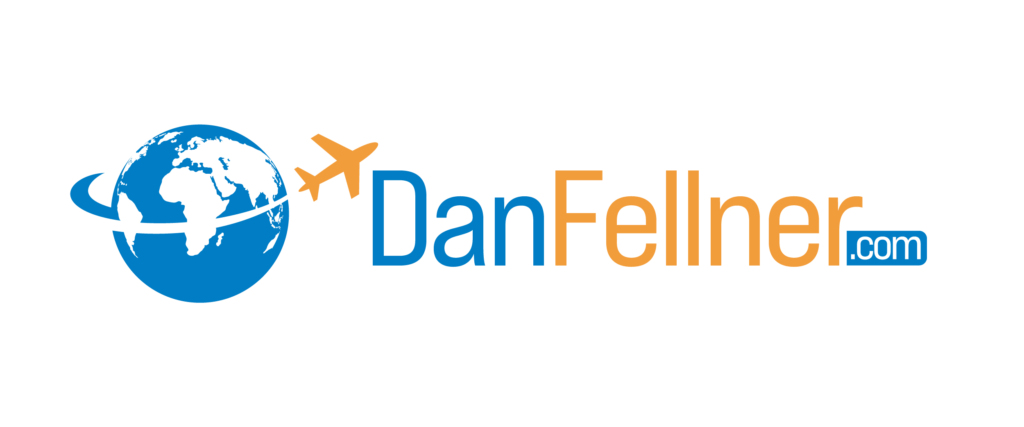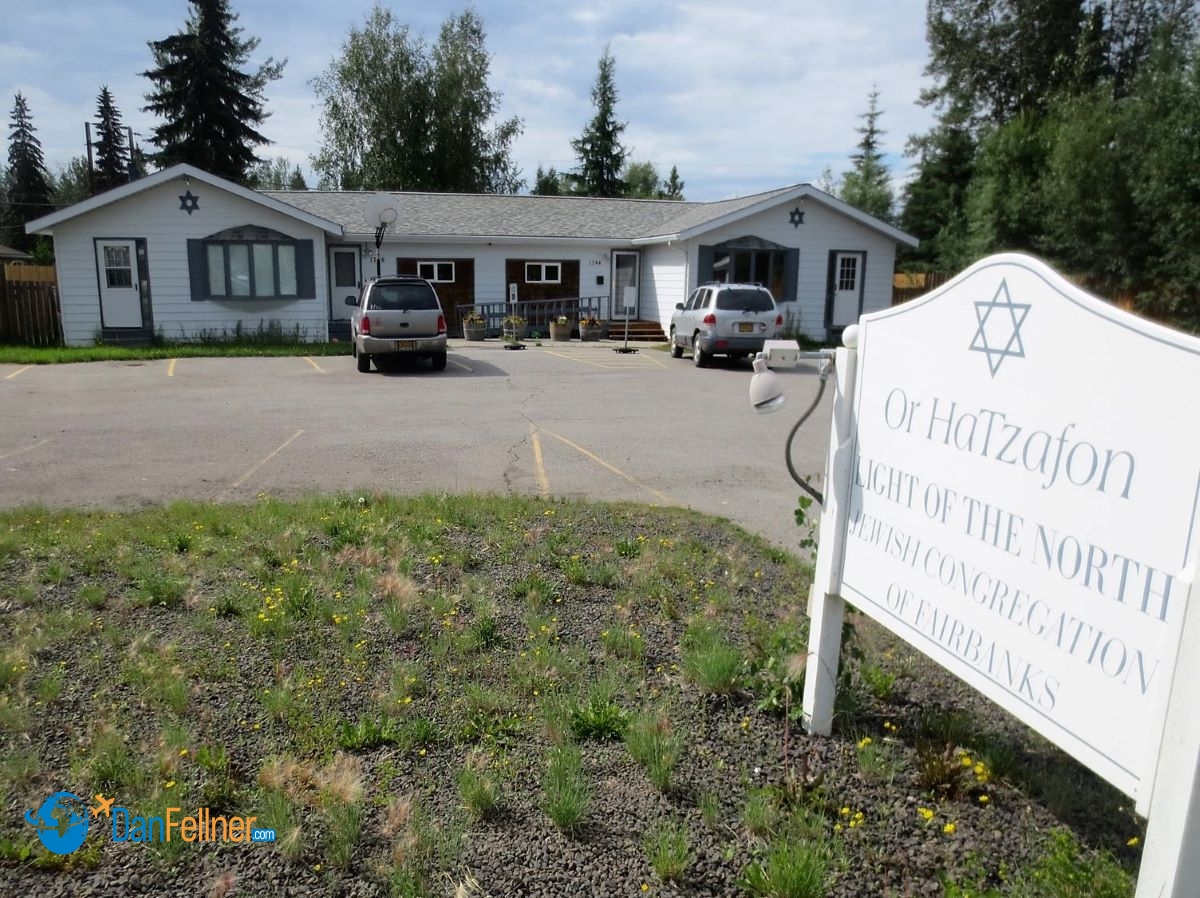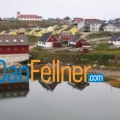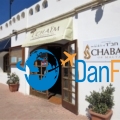Fairbanks’ Jewish community welcomes visitors to the northernmost synagogue in the world
Arizona Jewish Life Magazine — December, 2014
FAIRBANKS, Alaska — They proudly call themselves “the frozen chosen.”
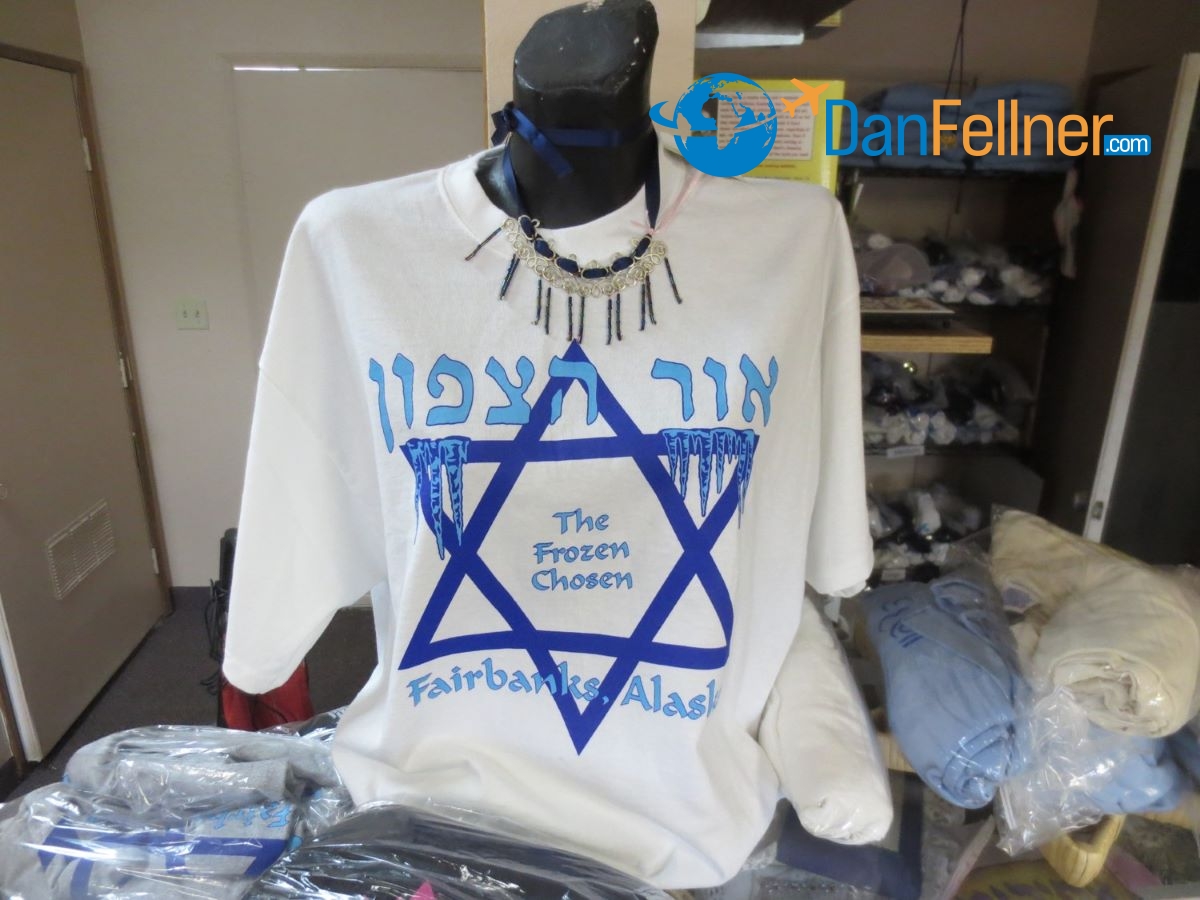
A “Frozen Chosen” shirt for sale in the Or HaTzafon Synagogue giftshop in Fairbanks.
It’s a clever moniker, and one that fits. Located less than 150 miles south of the Arctic Circle, the small and tight-knit Jewish community of Fairbanks, Alaska, must endure long, dark and brutally cold winters in a remote place where being an observant Jew can be as taxing as the Iditarod dog race.
Yet Congregation Or HaTzafon (Light of the North) has remained intact for more than 30 years. And despite a membership of only about 50 families, it has even managed to acquire and maintain its own house of worship.
At a latitude of 65 degrees north, this gives it the distinction of being the northernmost synagogue in the entire world. (Trondheim, Norway, is a close second. There is a Jewish congregation in Murmansk, Russia, that is farther north than Fairbanks, but it does not have a permanent synagogue).
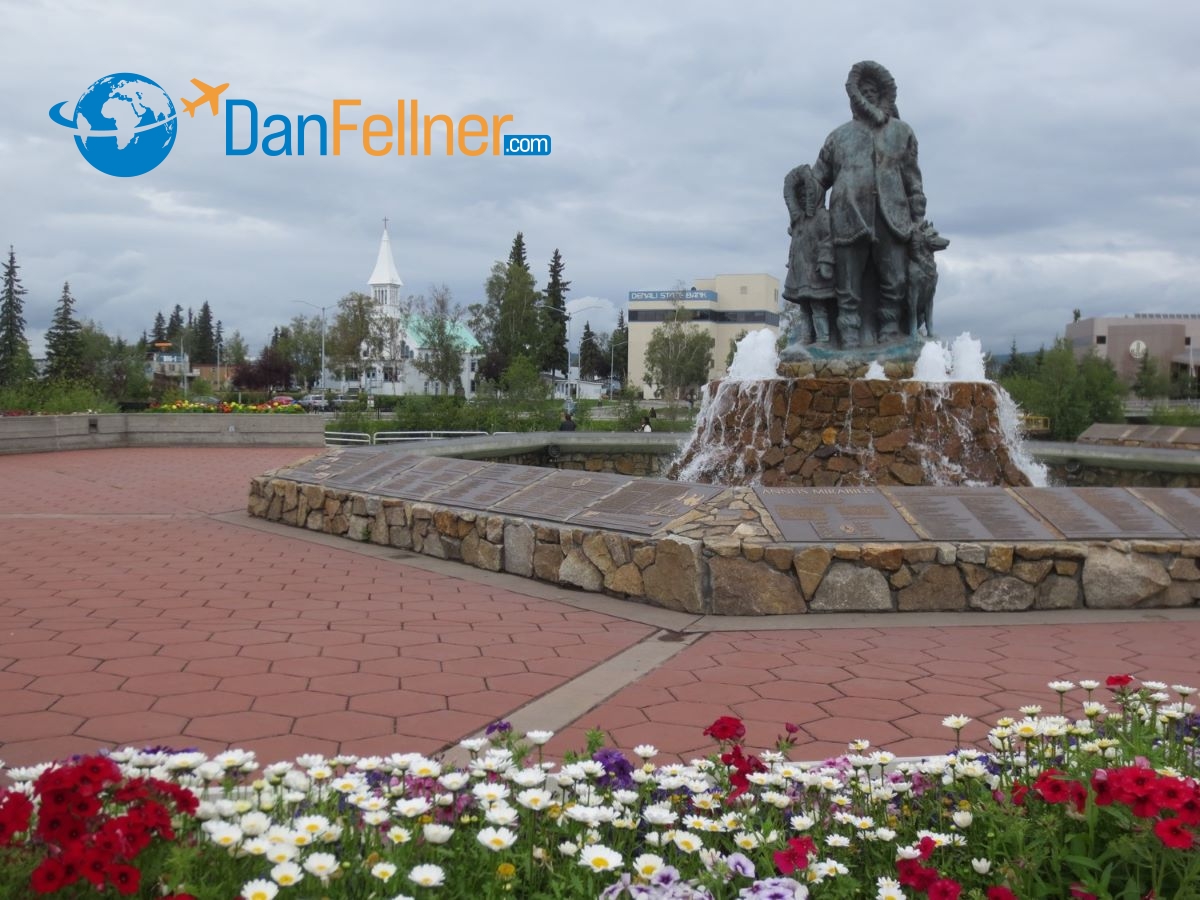
Downtown Fairbanks, Alaska, home of the world’s northernmost synagogue.
I recently had the opportunity to visit Or HaTzafon and meet with four of the congregation’s leaders during a visit to Alaska’s interior on a Holland America land tour following a cruise on the 1,450-passenger Volendam from Vancouver, Canada, to Skagway, Alaska. When I found out I would have a free afternoon in Fairbanks, I sent an email to the temple. Within minutes, I received a response inviting me for a visit.
Before my arrival in Alaska, I wanted to learn more about the Jewish presence in the country’s 49th state. I discovered that Jews have played a surprisingly prominent role in Alaska’s history ever since it was purchased from Russia in 1867. Initially, Jews were heavily involved in the fur trade. At the end of the 19th century, Lewis Gerstle, a Jewish steamboat operator, provided transportation to the Yukon during the famous Klondike Gold Rush. An Alaskan river now bears Gerstle’s name.
In 1920, a Jew named David Leopold was elected mayor of Anchorage. Ernest Gruening, a doctor and journalist originally from New York, served as governor of the Alaska Territory from 1939-1953 and was elected one of Alaska’s first two U.S. senators when it achieved statehood in 1959. During the cruise, I visited the state capitol building in Juneau and found a bust of Gruening on the second floor. An inscription beneath the statue calls Gruening “the father of Alaskan statehood.”
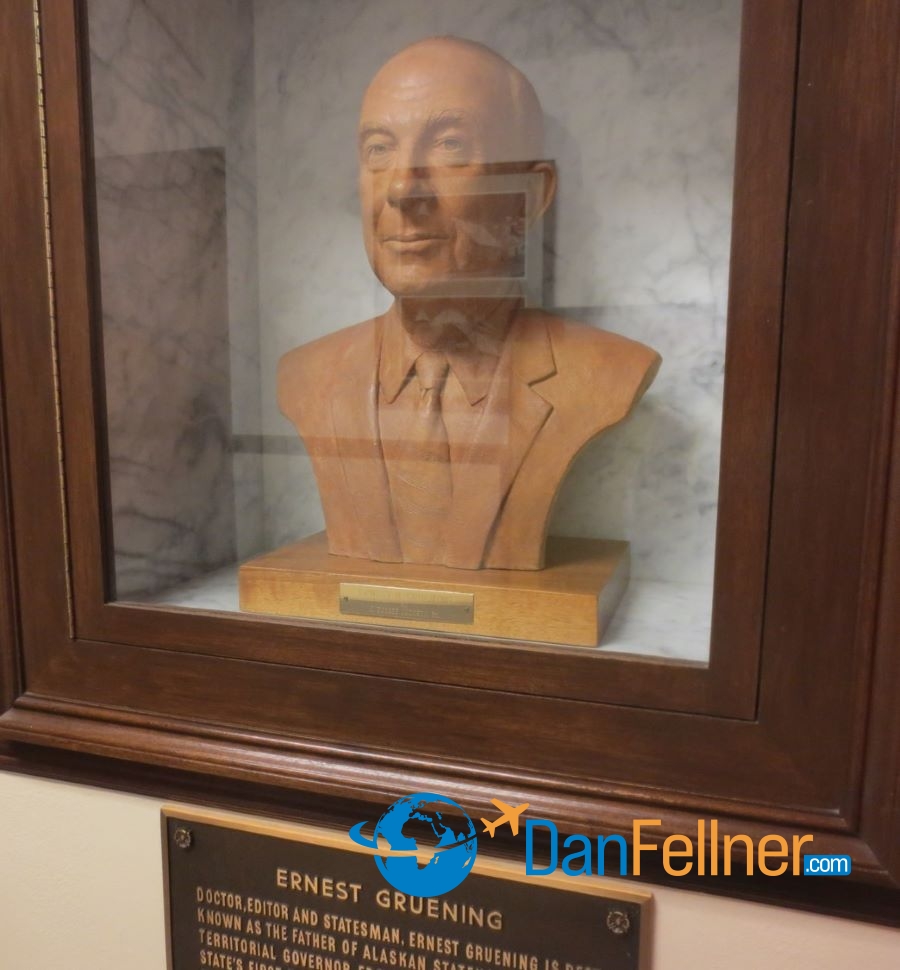
A bust of Ernest Gruening, a prominent Alaskan Jew and one of the state’s first two U.S. senators, on display at the Capitol Building in Juneau.
Fairbanks was established in 1902 and just two years later, its Jewish community was founded with the arrival of Robert Bloom. Originally from Lithuania, Bloom ran a general store in Fairbanks until 1941. He was one of the founders of the University of Alaska and led the city’s Jewish community for nearly a half-century. In the Clay Street Cemetery, just a block from my downtown hotel, I was able to see the Hebrew headstones of some of Fairbanks’ first Jewish residents.
Today, there are an estimated 6,000 Jews living in Alaska. Of those, some 40 percent belong to the state’s three synagogues – two in Anchorage (a Reform temple and a Chabad congregation) and Or HaTzafon in Fairbanks. Only about 6 percent of Alaskan Jews were actually born in the state.

The grave of one of Fairbanks’ first Jewish residents in the Clay Street Cemetery.
Interestingly, a study in the 1990s by a professor at Brandeis University found that Alaskan Jews are actually more observant than those in the lower 48 states. “Rather than this move to Alaska being an expression of assimilation, the first things that they do is try to connect up with other Jews,” wrote Professor Bernard Reisman, who added that contrary to public opinion, Alaska “is not a Jewish wasteland.”
Fairbanks has a large U.S. military presence and Jewish chaplains brought in by the military to meet the needs of GIs sustained the city’s Jewish community from the early 1940s until the 1980s. But by then, military numbers dwindled and the Jewish chaplaincy ended, leaving the civilian community on its own.
In 1980, the Jewish Congregation of Fairbanks was incorporated. During its early years, the congregation used facilities at the University of Alaska-Fairbanks and Fort Wainwright to hold religious services and Sunday school classes.
I walked three miles from my hotel to Or HaTzafon, which is located in a quiet residential area near the University of Alaska-Fairbanks. On the way, I passed several nondescript strip malls, a migratory waterfowl refuge and a store selling gear to gold prospectors.
Or HaTzafon, a Reform congregation, may not be a visually aesthetic temple, but its mere presence is – in some ways — as inspiring as some of the most architecturally splendid synagogues I’ve visited in Europe. Built in the 1970s as a residential duplex, the building was later converted into a day-care center. It was purchased in 1992 by the congregation for $80,000, with another $50,000 needed for renovations.
“We had two or three sugar daddies,” recalls Brenda Baxter, a member of the congregation since 1986 who now winters in Tucson. “Within a year, we paid off the mortgage.”

Cantorial student Kenneth Feibush in the sanctuary of Or HaTzafon in Fairbanks.
The temple can’t afford a full-time rabbi, but each summer brings in a student chaplain to conduct services. For the past two summers, Kenneth Feibush, a 26-year-old cantorial student at the Hebrew-Union College in New York, has completed internships at the temple. He likes the informality of the congregation, which allows him to try some things that might not fly in a more traditional East Coast synagogue.
“Everyone here is open to new ideas,” says Feibush, who lives at the synagogue when in Fairbanks. “I’m glad to be a part of that and to help shape the community.”
For the High Holy Days, the congregation brings in a retired rabbi from Juneau. For the rest of the year, services are led by members of the temple. Thad Keener, a fifth-grade teacher in Fairbanks and past president of the congregation, says not having a full-time rabbinical presence suits the personality of the congregation just fine.
“We’re a diverse community and we come from so many different parts of the country with our own different upbringings,” he says. “So we come here with an Alaskan, individualistic kind of thinking. We don’t want just one show in town. So the lay leadership allows for this kind of variety.”
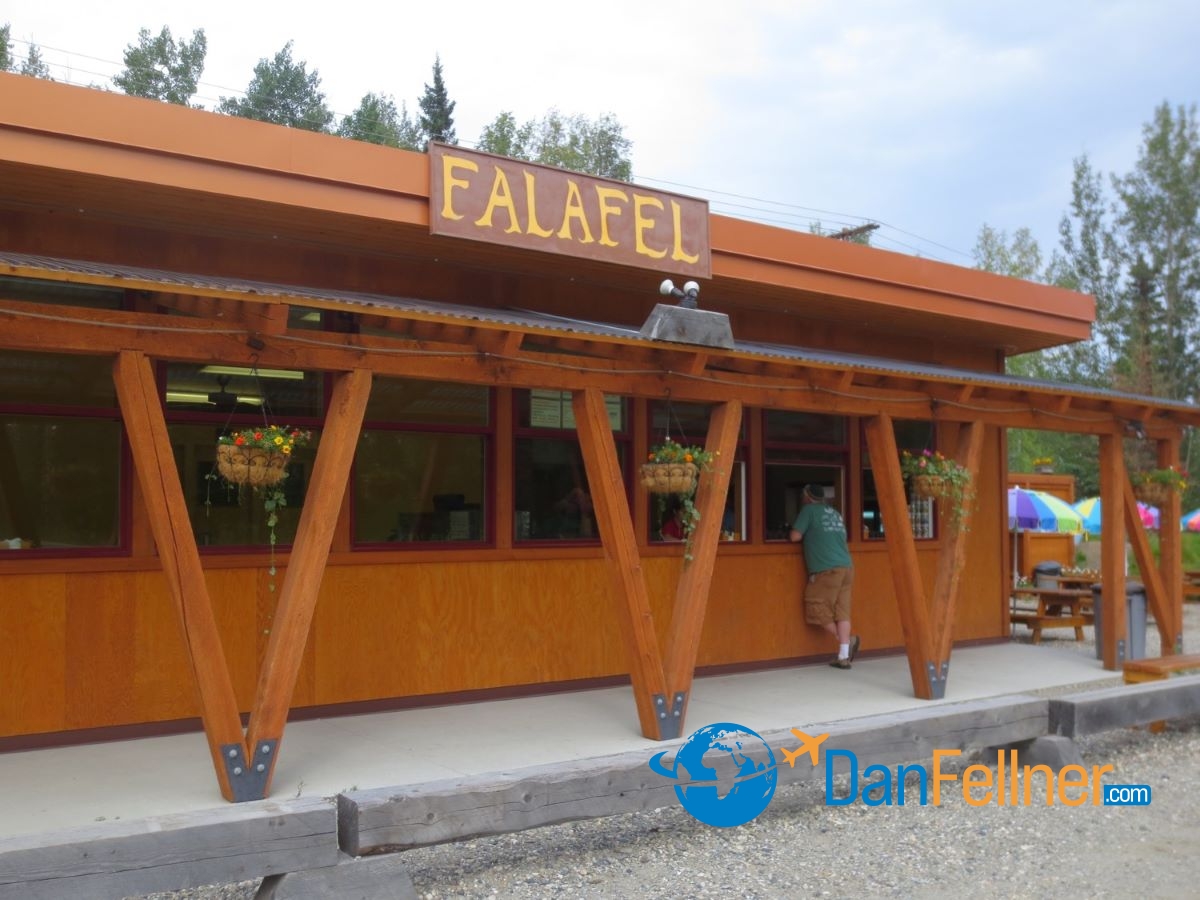
An Israeli-owned falafel stand in Fairbanks, Alaska.
The congregation enjoys solid relationships with other churches in Fairbanks, and for the past 17 years has even staged an annual Jewish film festival during the winter. Last year, about 300 people – most of them non-Jews — attended six different movies related to Jewish topics.
Feibush says that during his two summers here, he has been impressed by the closeness of the Jewish community, noting an extremely high turnout for bar mitzvahs and other family events.
“Here, we are each other’s family,” he says. “There’s a mutual love for each other that’s really something special.”
Like many small congregations, Or HaTzafon has financial challenges. Heating costs alone are about $7,000 a year. The congregation has come up with a creative way to raise money – selling “Frozen Chosen” tee-shirts in its gift shop. The shirts, which cost $22, feature icicles hanging from the upper bar of a Star of David.
To inquire about purchasing a shirt, visiting the temple or making a donation, contact the temple at orhatzafon@mosquitonet.com.
Some other northerly synagogues have filched Or HaTzafon’s “frozen chosen” slogan. But the congregation’s leaders say that no other temple can use the phrase with as much conviction.
“As the farthest north, we’re a little more frozen,” says Feibush with a smile.
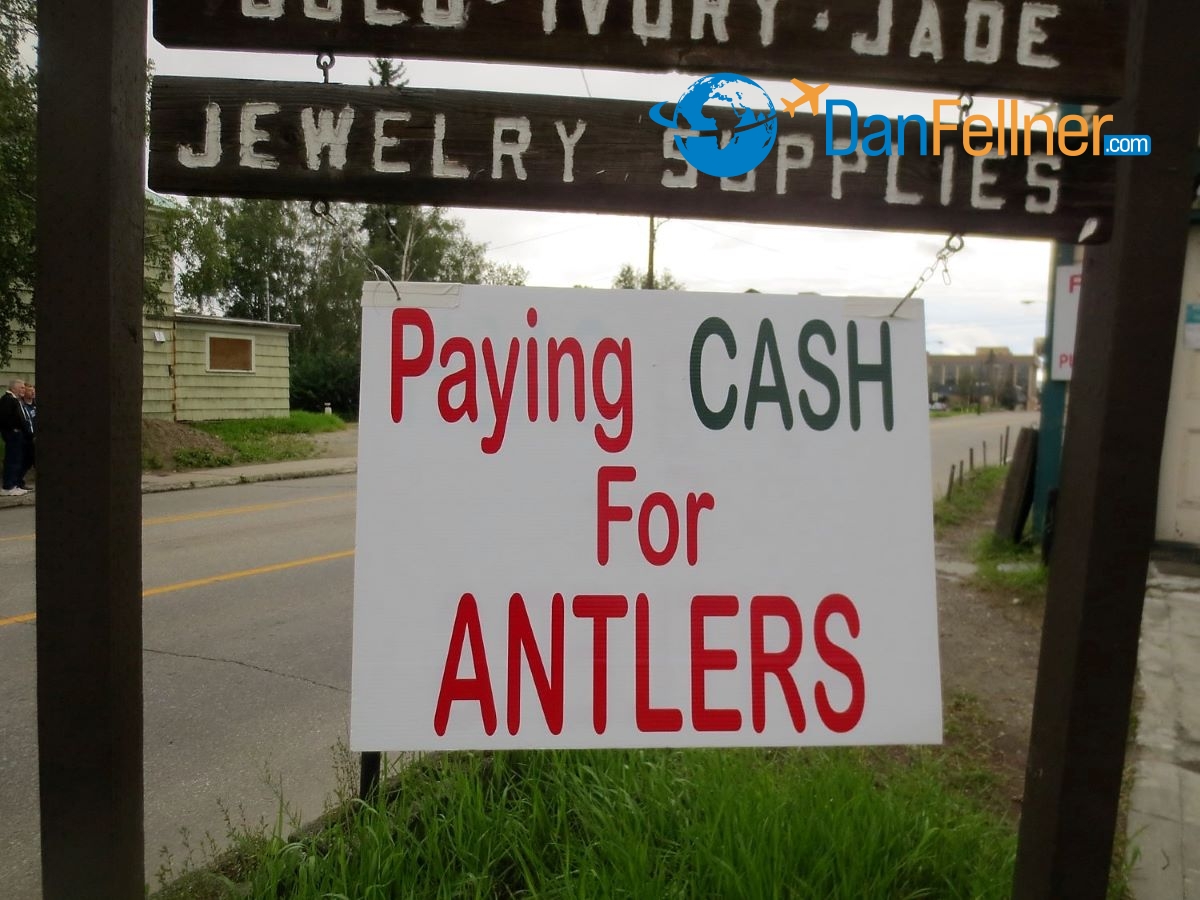
© 2014 Dan Fellner
